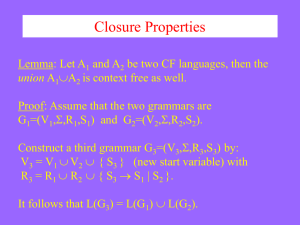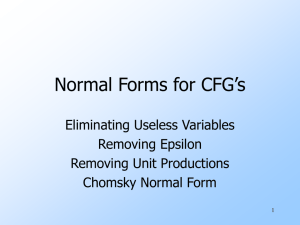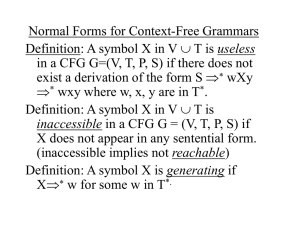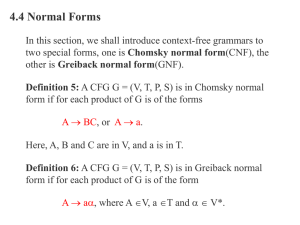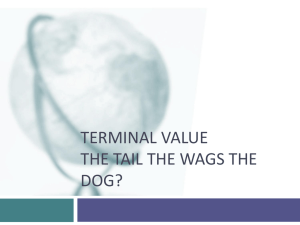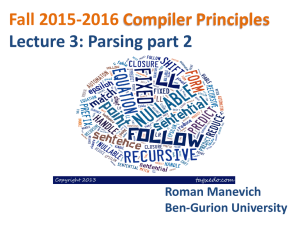context-free grammars 3
advertisement
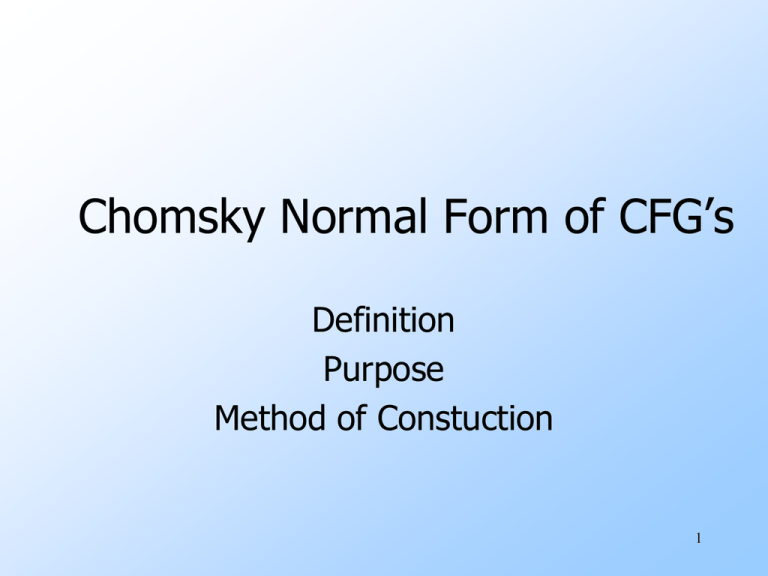
Chomsky Normal Form of CFG’s
Definition
Purpose
Method of Constuction
1
Chomsky Normal Form: Purpose
A construct used to establish properties
of context-free languages (CFLs)
Every CFL without e can be generated
by a CFG in Chomsky normal form.
To show that language without e is a
CFL it is sufficient to show that it has a
CFG in Chomsky normal form.
Typical approach to closure properites
2
Chomsky Normal Form:
Definition
A context free grammar (CFG) in which all
production are of the form A->BC or A->a,
where A, B and C are variables and a is a
terminal
3
Chomsky Normal Form: method
of construction
Eliminate “useless: symbols
Variables or terminals that do not appear in
any derivation of a terminal string from the
start symbol
Eliminate e-productions
A->e
Eliminate unit-productions
A->B for variables A and B
4
Chomsky Normal Form: method
of construction - 2
For each elimination task, a method will
be defined reclusively by an inductive
proof.
Order in which tasks are preformed is
important
5
Generating and Reachable Symbols
X is generating if X =>* w (terminal
string)
If X is a terminal, then it can generate
itself in zero steps.
X is reachable if S =>* aXb for some a
and b, (S is a start symbol)
Any symbol that is not generating and
reachable is useless
6
Induction to find generating
variables
Basis: If there is a production A -> w,
where w is a terminal string, then A is
generating.
Induction: If there is a production
A -> a, where a consists only of
terminals and variables known to derive
a terminal string, then A derives a
terminal string; hence is generating.
7
Algorithm to eliminate nongenerating variables
1. Discover all variables that derive
terminal strings.
2. For all other variables, remove all
productions in which they appear
either on the LHS or RHS of ->.
8
Example: finding generating variables
S->AB|C, A->aA|a, B->bB, C->c
Basis: A and C are generating due to
productions A->a and C->c.
Induction: S is generating due to
production S->C.
Eliminate B->bB and S->AB
Result: S->C, A->aA|a, C->c
Still have unreachable variables
9
Finding reachable symbols
Basis: Obviously, start symbol is reachable.
Induction: if we can reach A, and there is
a production A->a, then we can reach all
symbols of a.
In result from previous slide
S->C, A->aA|a, C->c
Only S and C are reachable
10
Epsilon Productions
Theorem: If L is a CFL with no empty
string, then it has a CFG which can be put
in Chomsky form with no e-productions.
A->e is clearly an e-production
To eliminate all types e-productions, we
must first discover the nullable variables,
i.e. variables A such that A =>* ε.
11
Inductive definition of nullable
symbols
Basis: If there is a production A -> ε,
then A is nullable.
Induction: If there is a production
A -> a, and all symbols of a are
nullable, then A is nullable.
12
Example: Nullable Symbols
S->AB, A->aA|ε, B->bB|A
A is nullable because of A -> ε.
B is nullable because of B -> A.
S is nullable because of S -> AB.
13
Algorithm to eliminate e-productions
Identify all nullable symbols.
Consider each production A->X1…Xn that contains
nullable symbols
Suppose A->X1…Xn contains m<n nullable
symbols
Construct a family of productions with 2m
members that are all combinations of nullable
symbols present or absent
If m=n exclude case with all symbols absent
14
Eliminating e-productions
The new CFG with no e-productions
consist of all families of productions
derived from productions with nullable
symbols
Plus all productions from the original
CFG that did not contain nullable
symbols
15
Example: Eliminating ε-Productions
S->ABC, A->aA|ε, B->bB|ε, C->ε
A, B, C, and S are all nullable.
Productions S->ABC|AB|AC|BC|A|B|C
come from S->ABC
Productions A->aA|a come from A->aA
Productions B->bB|b come from B->bB
16
Eliminating ε-Productions continued
S->ABC, A->aA|ε, B->bB|ε, C->ε
No contribution to CNF from original CFG
C is not generating
Eliminate C in productions of the new CFG
S -> ABC | AB | AC | BC | A | B | C
A -> aA | a
B -> bB | b
17
Define Unit Productions
A unit production is a production whose
right side consists of exactly one variable.
A->a is not a unit production if a is
terminal
Eliminate by expansion is most common
approach
18
Eliminate by expansion
In the CFG defined by
E->T|E+T
T->F|T*F
F->I|(E)
I->a|Ia
E->T eliminated by E->F|T*F|E+T
E->F eliminated by E->I|(E)|T*F|E+T
E->I eliminated by E->a|Ia|(E)|T*F|E+T
19
Eliminate by expansion
Will not work on cycles of unit productions
A->B
B->C
C->A
Alternative: find all pairs (A,B) such that
A=>*B by a sequence of unit productions
Works in all cases.
20
Alternative to expansion in
eliminating unit productions
Basic idea: If A=>*B by a series of
unit productions, and B->a is a nonunit-production, then add production A->
a and drop the unit productions.
Example
21
Example of basic idea
In the CFG defined by
E->T|E+T
T->F|T*F
F->I|(E)
I->a|Ia
E=>*I by the series of unit productions
E->T, T->F, F->I
I->a is a non-unit production.
Replace by E->a
E->a|Ia|(E)|T*F|E+T (same as
expansion method)
22
Pair search defined by induction
Find all pairs (A,B) such that A=>*B by a
sequence of unit productions only.
Basis: A=>*A, therefor (A,A).
Induction: If we have found (A,B), and
B->C is a unit production, then add (A,C)
23
Example of pair search
In CFG defined by
E->T|E+T
T->F|T*F
F->I|(E)
I->a|Ia
Obviously (E,T), (T,F), (F,I)
(T,I) and (E,F) also
24
Cleaning up a Grammar
Theorem: if L is a CFL, then there is a
CFG for L – {ε} that has:
1. No useless symbols.
2. No ε-productions.
3. No unit productions.
every right side of a production is either
a single terminal or has length > 2.
25
Clean-up continued
Proof: Start with a CFG for L.
Perform the following steps in order:
1. Eliminate ε-productions.
2. Eliminate unit productions.
3. Eliminate variables that derive no
terminal string.
4. Eliminate variables not reached from the
start symbol.
Must be first. Can create
unit productions and useless
variables.
26
Chomsky Normal Form
A CFG is said to be in Chomsky
Normal Form if every production is of
one of these two forms:
1. A -> BC (right side is two variables).
2. A -> a (right side is a single terminal).
Theorem: If L is a CFL, then L – {ε}
has a CFG in CNF.
27
Proof by construction
Step 1: “Clean” the grammar, so every
production has right side either a single
terminal or length >2.
Step 2: For each right side a single
terminal, make the right side all variables.
For each terminal a create new variable Aa and
production Aa -> a. (not a unit production)
Replace a by Aa in right sides of productions.
28
Example: Step 2
Consider production A -> BcDe.
We need variables Ac and Ae. with
productions Ac -> c and Ae -> e.
Note: you create at most one variable for
each terminal, and use it everywhere it is
needed.
Replace A -> BcDe by A -> BAcDAe.
29
CNF construction: final step
Step 3: Break right sides longer than 2
into a chain of productions with right
sides of two variables.
Example: A -> BCDE is replaced by
A -> BF, F -> CG, and G -> DE.
F and G must be used nowhere else.
30
Example text p266
S->AB
A->aAA|e
B->bBB|e
31
Assignment 11, Due 11-19-14
Exercise 7.1.2 text p 275 and 277
32
33
